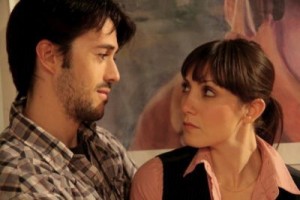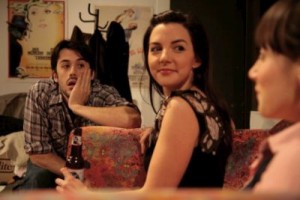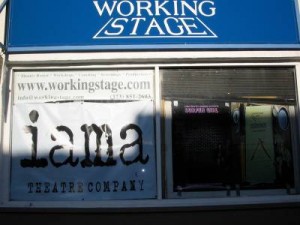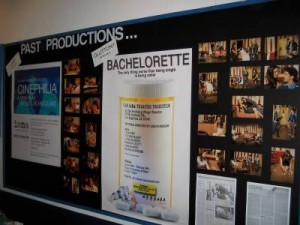

Wes Whitehead in Cinephilia, with (l.) Amy Rosoff and (r) Louise Munson
Two of the most provocative new plays I saw last season (Cinephilia, Bachelorette) were World Premieres produced by IAMA Theatre Company, a group of vibrant young actors eager to create new theater in Los Angeles.


IAMA’s began its life with a daunting first project—producing a series of seven brand new plays written by company member Leslye Headland and based on The Seven Deadly Sins (Lust, Gluttony, Greed, Sloth, Wrath, Envy, and Pride. Following Cinephilia and Bachelorette came Assistance and Surfer Girl. Next up for IAMA is number five in the series, Reverb.
Company members are all theatre and film graduates such prestigious institutions as NYU’s Tisch School of the Arts, The American Conservatory Theater, Steppenwolf Theatre in Chicago, and Playwrights Horizons Theatre School, to name just a few.
Reverb features NYU’s Tisch School grad and IAMA founding member/Artistic Director Wes Whitehead, whose performance in Cinephilia was one of last season’s most memorable. We appreciate Wes’s taking time to answer our questions about IAMA and and the upcoming Reverb.
Hi Wes. I understand that IAMA Theatre Company was founded by a bunch of recent NYU Tisch School Of The Arts grads living in L.A. How did that come about?
IAMA began as a number of NYU transplants looking for a way to step outside of the Hollywood system and create a safe environment where we could make work we were passionate about. Of course, now we have members from all over the country and other prestigious drama programs, but the one thing we all share is a deep commitment to the work, and that driving force behind the company has remained the same despite our continued growth.
What made you all decide on L.A.-based careers rather than stay in New York or on the East Coast?
I think we all came to LA for different reasons, but it definitely has something to do with the fact that there are just more opportunities to build a career in LA than there are in New York.
Why do theater in a city where so many actors have only TV or film work as their goal?
Theater is what we know how to do and what we love to do. We wanted to make our own work, and we don’t make films, we make theater.
How tough (or easy) has it been to build an audience in a city where on any given weekend, theatergoers have literally hundreds of stage productions to choose from?
It’s never easy, but like all fledgling companies, we started with a base of friends and family, and it’s a matter of producing good work that our base audience wants to spread the word about. It’s through the tremendous support of those friends and family that we are now blessed with not just full houses, but really engaged and enthusiastic audiences.
What made IAMA decide on such a monumental undertaking—world-premiering seven brand new plays—as your first major project as a theater company?
Two words. Leslye Headland. We literally had no plan. We were a company in search of original material, and Leslye presented us with an incredible opportunity, not just because of the scope of the project, but because of her enormous talent. For as much work as it has been for us to produce each play in the series, that effort is matched by the dedication that Leslye puts into the writing and directing of each script.
You began the cycle with Cinephilia, which StageSceneLA described as “a satisfying and well-written drama (with laughs) which offers four talented up-and-coming actors the chance to show their stuff.” Which Deadly Sin was that and how did the play reflect that sin?
The sins are presented in our series in the same order they appear in Dante’s Divine Comedy. This put Lust first. It was reflected in Cinephilia through the relationship of two lonely movie-buffs, Johnny and Arden. Their attempt to have routine sex without commitment is driven by the same longing created by repeated DVD viewings—a lust to recreate the initial thrill of experiencing pleasure. It’s impossible to really sum up these plays in a few sentences, because the beauty of Leslye’s plays is that each sin is so complex and layered. Like all of her work, the play is really about the addiction to the sin, and not the literal manifestation of the sin itself.
Wes, this past September, StageSceneLA cited you on our Best Of 2007-2008 Lists in the category Best Performance By A Featured Actor In A Drama. What was it about your role as Plato that brought out the best of your talents as an actor?
I was very flattered to be mentioned. Plato is an actor’s dream, simply because the writing is so good and he is so much fun to play—it really brought out the kid in me. In Cinephilia, Plato serves as the comic relief, which is always a joy for any actor, because it’s built into the script for the audience to laugh at Plato, and therefore already love him. Leslye gave me some of the best lines I will ever have in my career.
Bachelorette, the second of the Seven Deadly Sins plays, featured a cast of (to quote StageSceneLA’s review) “pretty complicated, conflicted, and not terribly nice people.” Is it more fun to play someone bad or someone good?
If we’re doing our job well, then there is no difference between playing a villain or a hero. As soon as you identify a character as “good” or “bad”, then you are doomed to play a caricature, rather than a human being. The biggest challenge to playing an un-sympathetic character is to not judge that character.
Next up for IAMA is Reverb, which has “troubled lovers purg(ing) mutual pain by inflicting it on each other.” Can we expect some laughs from this play about Wrath?
Every day, real life is both funny and tragic, and so are these plays. Leslye has infused Reverb, like all the plays that have preceded it, with real people, real situations, and her unique take on our generation’s struggle to grow up. We’re always surprised by where people laugh and where people cry when they’re watching these plays. The only thing we do know is that it’s impossible to be a passive participant when seeing Leslye’s work.
Leslye directed three of the first four Deadly Sins plays, the others being Assistance and Surfer Girl, which I’m sorry I didn’t get to see. Now she’s directing Reverb as well. What’s it like to have the playwright direct her own work?
Before Leslye was a playwright, she was trained as both an actor and director at NYU, so even if she weren’t the incredible writer that she is, we would want to work with her as a director. Her intention is the same as ours—to tell stories that are truthful.
How much of the writing changes during the rehearsal project?
Every play is different and there’s no set process. From Leslye’s inspiration for the plot and characters to our performances opening night, there will always be debates and discussions. But when the playwright and director are the same person, changes can be made swiftly. Plus, with such a common and solid goal, there’s no failure, only growth and authentic work.
What can playgoers expect from Leslye’s latest?
With each play, Leslye grows as a writer, and we believe that Reverb is some of her best work to date. We believe that this is a really unusual play about topics rarely seen on stage, and we really don’t want to give anything away. We are thrilled about it, and can’t wait to fill the house come January.
What kind of work do you see in IAMA’s future, once the Seven Deadly Sin cycle is complete?
We have some vague ideas about what we’re going to do in the future, but right now we’re consumed with the task at hand. As you said, it’s an enormous undertaking, and to do it justice, we have to stay focused on this project. That being said, IAMA will be looking for any new opportunities that might come our way after the Seven Deadly Sins series is completed. Obviously we don’t know what the future holds but we will approach our next project with the same passion that bred the success we’ve experienced so far.
Thanks Wes. I’m even more excited now about experiencing Wrath in Reverb!
For more information about IAMA Theatre Company, visit
http://www.iamatheatre.com


 Since 2007, Steven Stanley's StageSceneLA.com has spotlighted the best in Southern California theater via reviews, interviews, and its annual StageSceneLA Scenies.
Since 2007, Steven Stanley's StageSceneLA.com has spotlighted the best in Southern California theater via reviews, interviews, and its annual StageSceneLA Scenies.







 COPYRIGHT 2024 STEVEN STANLEY :: DESIGN BY
COPYRIGHT 2024 STEVEN STANLEY :: DESIGN BY